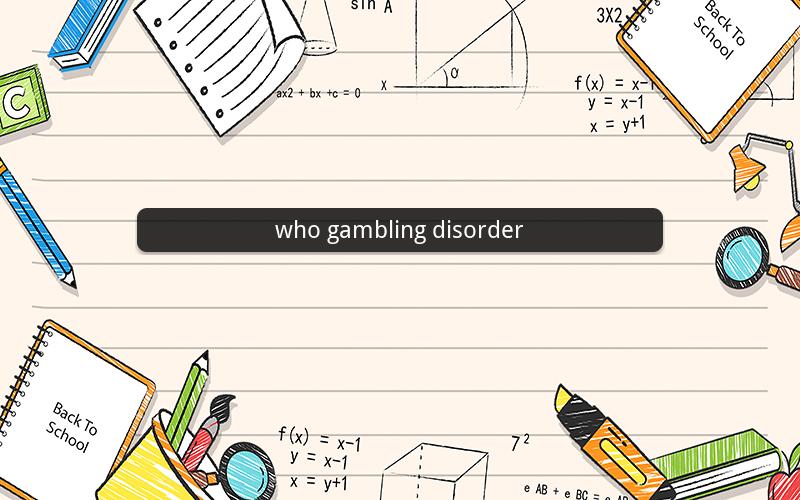
Contents
1. Introduction to Gambling Disorder
2. Understanding the Nature of Gambling Disorder
3. Risk Factors and Causes of Gambling Disorder
4. Symptoms and Signs of Gambling Disorder
5. Psychological and Emotional Effects of Gambling Disorder
6. Social and Economic Consequences of Gambling Disorder
7. Diagnosis and Evaluation of Gambling Disorder
8. Treatment Options for Gambling Disorder
9. Support and Resources for Individuals with Gambling Disorder
10. Conclusion
---
1. Introduction to Gambling Disorder
Gambling disorder, often referred to as pathological gambling or compulsive gambling, is a behavioral addiction characterized by an inability to control the urge to gamble, despite negative consequences. This disorder affects individuals of all ages, genders, and socioeconomic backgrounds, often leading to significant distress and impairment in various aspects of life.
2. Understanding the Nature of Gambling Disorder
Gambling disorder is considered a mental health disorder by the American Psychiatric Association (APA) and is classified under the category of addictive disorders. It is characterized by the repetition of problematic gambling behavior that disrupts personal, family, and social functioning.
3. Risk Factors and Causes of Gambling Disorder
Several factors contribute to the development of gambling disorder. These include genetic predisposition, environmental influences, personality traits, and co-occurring mental health conditions. Factors such as a history of trauma, substance abuse, and impulsive behaviors can also increase the risk of developing this disorder.
4. Symptoms and Signs of Gambling Disorder
The symptoms of gambling disorder include an irresistible urge to gamble, increased time spent gambling, preoccupation with gambling, a need to increase the amount of money or time spent gambling to achieve the desired excitement, restlessness or irritability when attempting to stop gambling, and chasing losses.
5. Psychological and Emotional Effects of Gambling Disorder
Gambling disorder can have severe psychological and emotional effects on individuals. These may include depression, anxiety, substance abuse, social isolation, and increased risk of suicide. The emotional turmoil can also impact family dynamics, leading to strained relationships and trust issues.
6. Social and Economic Consequences of Gambling Disorder
The social and economic consequences of gambling disorder are profound. Individuals may face financial ruin, legal problems, and employment issues. Relationships can suffer as a result of financial stress, and there is an increased risk of homelessness and unemployment.
7. Diagnosis and Evaluation of Gambling Disorder
Gambling disorder is diagnosed based on specific criteria outlined in the APA's Diagnostic and Statistical Manual of Mental Disorders (DSM-5). These criteria include the presence of at least four of the following symptoms within a 12-month period.
8. Treatment Options for Gambling Disorder
Treatment for gambling disorder often involves a combination of therapeutic approaches, including cognitive-behavioral therapy (CBT), contingency management, and motivational interviewing. Medications may also be used to address co-occurring mental health conditions.
9. Support and Resources for Individuals with Gambling Disorder
Support and resources are crucial for individuals struggling with gambling disorder. Support groups, such as Gamblers Anonymous, offer a sense of community and understanding. Professional help from therapists and counselors is also essential for recovery.
10. Conclusion
Gambling disorder is a complex and challenging condition that requires comprehensive treatment and support. By understanding the nature of the disorder, identifying risk factors, and seeking appropriate help, individuals with gambling disorder can take steps towards recovery and a healthier life.
---
Questions and Answers
1. What are the primary risk factors for developing gambling disorder?
- Genetic predisposition, environmental influences, personality traits, and co-occurring mental health conditions are primary risk factors for developing gambling disorder.
2. How does gambling disorder impact a person's finances?
- Gambling disorder can lead to financial ruin, including bankruptcy, loss of savings, and the inability to meet financial obligations.
3. Can medication help treat gambling disorder?
- While there are no medications specifically for gambling disorder, certain medications may be used to address co-occurring mental health conditions that contribute to the disorder.
4. What is the most effective treatment for gambling disorder?
- Cognitive-behavioral therapy (CBT) is often considered the most effective treatment for gambling disorder, as it helps individuals develop healthier gambling behaviors and coping strategies.
5. Are there any support groups available for individuals with gambling disorder?
- Yes, support groups such as Gamblers Anonymous provide a sense of community and understanding for individuals with gambling disorder.
6. How can someone determine if they have a gambling problem?
- Individuals can assess their gambling behavior using the DSM-5 criteria, which outline specific symptoms of gambling disorder.
7. What role does family support play in the recovery process?
- Family support is crucial in the recovery process, as it can help individuals maintain sobriety and provide emotional support during difficult times.
8. Can gambling disorder lead to physical health problems?
- Yes, gambling disorder can lead to physical health problems, including stress-related conditions, sleep disturbances, and other health issues due to poor lifestyle choices.
9. Is there a genetic component to gambling disorder?
- Yes, research suggests that there is a genetic component to gambling disorder, as individuals with a family history of gambling problems are at a higher risk of developing the disorder.
10. How long does it take to recover from gambling disorder?
- Recovery from gambling disorder is a lifelong process, with varying lengths of time for individuals to achieve sustained recovery.